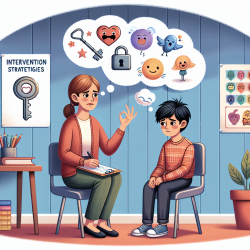As a practitioner working with children with Developmental Language Disorder (DLD), it's crucial to leverage research-based insights to create the best outcomes for your clients. A recent longitudinal study, "Positive Aspects of Emotional Competence in Preventing Internalizing Symptoms in Children with and without Developmental Language Disorder," provides valuable information on how emotional competence can serve as a protective factor against internalizing symptoms like social anxiety and somatic complaints in children with DLD.
Understanding the Study
This study followed children with and without DLD over a nine-month period, focusing on how their emotional competence affected their levels of social anxiety and somatic complaints. The key findings indicate that higher levels of emotional awareness and positive emotions were linked to lower levels of internalizing symptoms in both groups. Importantly, children with DLD showed significant benefits from increased emotional awareness.
Key Takeaways for Practitioners
Here are some actionable insights from the study that can help you improve your practice:
- Focus on Emotional Awareness: Increasing a child's ability to identify, understand, and label their emotions can significantly reduce social anxiety and somatic complaints. Consider incorporating activities that help children recognize and articulate their feelings.
- Promote Positive Emotions: Encourage activities that foster positive emotions. Positive emotions have been shown to broaden thought-action repertoires and improve mental health, serving as a buffer against negative emotions.
- Communication About Emotions: Helping children communicate about their emotions can mitigate internalizing symptoms. This can involve teaching them how to express their feelings and understand the emotions of others.
- Tailored Interventions: While general emotional competence interventions can be beneficial, tailoring these interventions to meet the specific needs of children with DLD can yield better outcomes. Use visual aids and simplified language to ensure comprehension.
Implementing the Findings
To implement these findings effectively, consider the following steps:
- Assessment: Regularly assess the emotional competence of children with DLD using validated tools. This can help you track progress and identify areas needing intervention.
- Parental Involvement: Engage parents in the process. Educate them about the importance of emotional competence and provide them with strategies to support their children at home.
- Collaborative Approach: Work closely with other professionals, such as psychologists and educators, to create a holistic intervention plan that addresses both language and emotional competencies.
Conclusion
Emotional competence plays a crucial role in mitigating internalizing symptoms in children with DLD. By focusing on emotional awareness, promoting positive emotions, and facilitating communication about emotions, practitioners can make a significant impact on the well-being of these children.
To read the original research paper, please follow this link: Positive Aspects of Emotional Competence in Preventing Internalizing Symptoms in Children with and without Developmental Language Disorder: A Longitudinal Approach.










